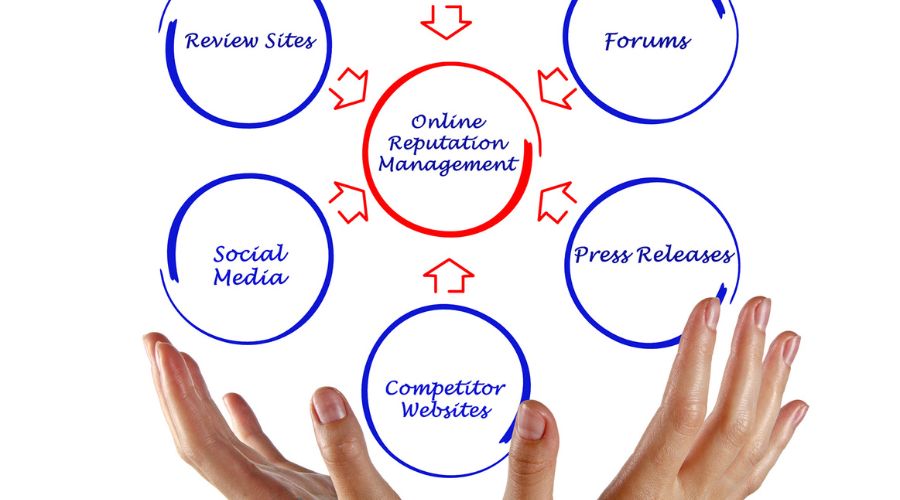Did you know that 95% of customers share bad experiences online and offline? Only 47% share good ones. In today’s world, your online reputation is key to success. A solid online reputation management strategy is crucial for your brand in Australia.
As a business owner, you know how important customer reviews and social media are. But do you have a plan to keep your online image strong? We’ll show you how to build trust, improve your brand, and avoid reputation risks.
Key Takeaways
- A strong online reputation attracts new customers and strengthens existing ones. A weak one can lose both.
- Online reviews and social media greatly affect buying decisions. 93% of consumers say both good and bad reviews matter.
- Good reputation management means watching, responding to, and guiding online talks about your brand.
- Being open, real, and quick to respond builds trust and helps avoid crises.
- Using positive content, like media mentions and influencer partnerships, can improve your reputation by pushing down negatives.

What is Online Reputation Management?
Online reputation management (ORM) is about keeping an eye on how people see your business online. It involves handling reviews, social media, and search results. The main aim is to make sure your brand looks good when people search for it online.
The Importance of Online Reputation Management
ORM is key for any business. It affects your brand’s image, risk, growth, investor relations, and gives insights into what customers think. Here are some facts:
- Almost 60% of U.S. consumers stated that they would avoid purchasing from a brand that appears untrustworthy.
- 59% of shoppers perform online research before making a purchase.
- 97% of consumers consult product reviews prior to making a purchase.
- Customers whose complaints on social media were resolved in under five minutes tended to spend more on future purchases.
It’s vital to manage your online reputation. A bad incident can hurt your business a lot. For instance, United Airlines lost over $1 billion in market value due to a negative online reputation incident when a video of a passenger being forced off an overbooked flight went viral. Also, Nestlé’s online reputation was damaged when accusations of harmful environmental practices surfaced online, leading to negative consumer sentiment.
By actively managing your online reputation, you can reduce risks, improve your brand, and open doors for growth, investor relations, and insights into what customers want.
The Role of Social Media
Social media is key in today’s world for businesses to manage their online image. It can either help or hurt your brand’s reputation. It’s important to manage your social media well to shape how people see your brand and build strong customer ties.
Studies reveal that 51% of consumers think brands are more memorable if they respond on social media. Also, 76% of consumers check online reviews when looking for local businesses. And 46% trust these reviews as much as personal recommendations. Businesses can use social media to listen to customers and show they care about service.
Moreover, 68% of consumers follow brands to learn about new products. And 76% value quick responses from brands on social media. By being active and quick to respond, businesses can improve their image, gain trust, and build strong relationships.
| Social Media Statistics | Percentage |
|---|---|
| Consumers who agree that responding to customers on social media makes brands the most memorable | 51% |
| Consumers who regularly read online reviews when browsing for local businesses | 76% |
| Consumers who feel that online business reviews are as trustworthy as personal recommendations | 46% |
| Consumers who primarily follow brands on social media to stay informed about new products or services | 68% |
| Consumers who value how quickly a brand can respond to their needs on social media | 76% |
Being proactive with online reputation management on social media is crucial. It lets businesses keep an eye on what’s being said and talk to customers. This way, they can improve their brand image and customer engagement, boosting their online reputation.
Monitoring Your Online Reputation
Keeping a good online reputation is key for any business or person. We need to watch our digital presence closely. This means checking social media, review sites, news, and what influencers say about us.
Identifying Relevant Channels
Monitoring our online reputation means looking at feedback from many places. This includes news, forums, social media, YouTube videos, and review sites. Tools help us track these conversations, giving us insights into what people think and what’s trending.
It’s important to watch for branded searches, product keywords, industry terms, and mentions of competitors. By being proactive and addressing problems quickly, we can improve our brand’s image. This leads to more meaningful conversations and better visibility online.
| Reputation Monitoring Tools | Key Features |
|---|---|
| Google Alerts | Real-time alerts, comprehensive monitoring, sentiment analysis |
| Brand24 | Social media monitoring, influencer tracking, competitive analysis |
| Mention | Multi-channel monitoring, real-time alerts, reputation scoring |
Using these powerful tools, businesses can stay on top of issues. They can build better relationships with customers and find valuable insights. This helps keep a strong, positive online image.
Reputation Management Tactics
Keeping a good online reputation is key for any business. It needs a mix of strategies. This includes managing reviews and engaging on social media to shape your brand’s image online.
Responding to Mentions
Quick and right responses to online mentions are vital. This means tackling both good and bad comments fast. It helps build strong relationships with your audience through social media engagement.
Research shows 53% of buyers check online before buying. This highlights the need to watch and manage your online review management efforts. Bad reviews can hurt your sales.
Good mentions, however, can boost your trust and authority. This can lead to better search rankings. By crisis prevention and engaging with your audience, you can keep your online image positive.
“A strong CEO reputation can influence brand reputation, affecting stock prices and investor confidence.”
In short, a solid online reputation management tactics plan is crucial. It should cover review management, social media, and crisis prevention. This is vital for businesses to succeed online.
Leveraging Positive Content
Keeping a good online reputation is key for businesses today. One smart move is to share and promote great, positive content. This means writing interesting blog posts, making company videos, and getting good press like articles and interviews.
Using positive content wisely can lessen the blow of bad reviews or press. It makes sure people see your brand’s best side, even if they’ve seen some negative feedback before.
Creating user-generated content is also a good idea. It shows happy customers and their good experiences. This builds trust and credibility, and it’s a big plus for people thinking about buying from you.
Also, doing well in search engine optimization (SEO) and public relations helps your positive content get seen more. This can bring in new customers and keep the ones you have, helping your business grow.
In short, managing your online reputation well is vital for success today. It’s all about using positive content and more to stand out.
online reputation management Strategies
Seeing online reputation management as a key business goal is essential. Set clear goals and know how you’ll measure success. This could be through getting more positive reviews, responding faster to online questions, or getting more positive social media mentions.
Building brand advocacy is important, both inside and outside your company. Being open and honest helps build trust with your audience. Listening to and acting on customer feedback can also boost your online image. By responding to real feedback, whether it’s good or bad, you can learn and improve your brand.
- Use data from social media and reviews to find areas to get better.
- Train your teams well to handle social interactions effectively.
- Make communications personal to improve customer engagement and loyalty.
- Use AI to predict what customers need and make their experiences better.
A good online reputation is key for attracting new clients and getting referrals. A solid brand communication plan and active media relations can help keep and improve your brand’s online image.
| Online Reputation Management Strategies | Benefits |
|---|---|
| Monitoring social media and online reviews | Learn what customers like and fix problems quickly |
| Responding to customer feedback in a timely and personalized manner | Make customers happier and build trust |
| Leveraging positive content and reviews | Improve how people see your brand and attract new customers |
| Implementing crisis management strategies | Lessen the harm from bad feedback and protect your brand |
By being strategic and proactive in managing your online reputation, you can succeed in the digital world. You can build brand advocacy and provide amazing customer experiences that lead to lasting success.

Handling Negative Feedback
In today’s world, negative feedback and online reviews can really hurt a business’s image. But, it’s important to face these issues head-on with honesty and openness. When we get negative comments, we should answer quickly and politely. We should admit any mistakes and tell how we’re fixing the problem.
Crisis Management
When a crisis hits, being clear and honest is crucial. Instead of hiding or deleting bad comments, we should use them to show we care about our customers. By saying sorry, explaining what happened, and telling how we’re fixing it, we can protect our brand’s image.
Studies show that nearly 90% of consumers read online reviews before visiting a business. And 94% of consumers say negative reviews have stopped them from going to a business. This shows how vital it is to handle negative feedback well and keep a good online image.
One good way is to ask customers to leave reviews but not fake ones. Having both good and bad reviews, but mostly good, can make our business seem more trustworthy. Also, answering negative reviews in 24-48 hours shows we really care about our customers’ concerns.
“Crafting a professional response to negative reviews can show our commitment to addressing customer concerns and implementing changes based on their feedback.”
By being real and open with negative feedback and crisis management, we can turn problems into chances to improve our online image and gain customer trust.
The Impact of Online Reputation
In today’s world, your business’s online reputation is key. 90% of customers check online reviews before visiting. This makes your online presence very important for making sales and growing your business.
A good online reputation builds trust with customers. It also helps your business grow and keeps investors happy. In fact, a business’s reputation can be worth half its market value. This shows how important it is to manage your online image well.
Every star on Yelp can increase your revenue by up to 9%. Being active on social media can also stop up to 15% of customers from leaving. These facts show how crucial online reviews and social media are for your business.
| Metric | Impact |
|---|---|
| Online Reviews |
|
| Social Media Engagement |
|
| Reputation Management Tactics |
|
Managing your online reputation well can help your business grow. It builds trust with customers and keeps investors happy. By understanding the power of online reputation, you can create a plan to improve your digital image. This will help your business succeed in the long run.
Conclusion
Building a strong online reputation is key for success today. People want to see businesses active online and on social media. It’s important to do it well.
By staying away from bad online reputation and using smart strategies, we can draw in new customers. We can also make our current customers happier. This can lead to more sales and a better image of our brand.
With strong online reputation management, we can stand out in a busy market. We can gain trust and credibility from our customers. This also helps us show up better in search results.
By keeping an eye on our online presence, we can turn bad feedback into chances to grow. Happy customers are more likely to share good things about us. They might even tell others to check us out.
Using AI tools can make managing our online image even better. They help us talk to customers better, respond to reviews faster, and learn how to get even better. As the digital world changes, keeping a good online reputation will be more important than ever.
FAQ
What is online reputation management?
Online reputation management is about keeping an eye on how people see your business online. It involves handling reviews, social media, and search results.
Why is online reputation management important?
It’s key because it shapes how people view your brand. It helps avoid risks, grow your business, and keep investors happy. It also gives you insights into what customers think.
How does social media impact online reputation?
Social media makes it easier for people to talk about your brand. Managing your brand’s social media presence is vital for your online reputation.
What are the key channels to monitor for online reputation?
You should watch social media, review sites, news, and influencer mentions. Knowing where your audience hangs out is crucial for a good online reputation strategy.
What are some effective online reputation management tactics?
Good tactics include managing reviews, engaging on social media, and preventing crises. It’s important to respond well to all mentions, good or bad.
How can I leverage positive content to manage my online reputation?
Use positive content to push down negative stuff. Publish great blog posts, videos, and PR pieces. This helps keep your online image strong.
What are some key strategies for effective online reputation management?
Treat online reputation like any business goal. Set clear goals, build brand advocates, be transparent, and listen to feedback.
How should I handle negative feedback and reviews?
Don’t delete comments. Respond quickly and honestly. Say sorry, explain what you’re doing to fix it, and promise it won’t happen again.
How does online reputation impact my business?
Your online reputation affects sales. 53% of buyers check you out online before buying. Good buzz can bring repeat business, while bad can hurt your success.




